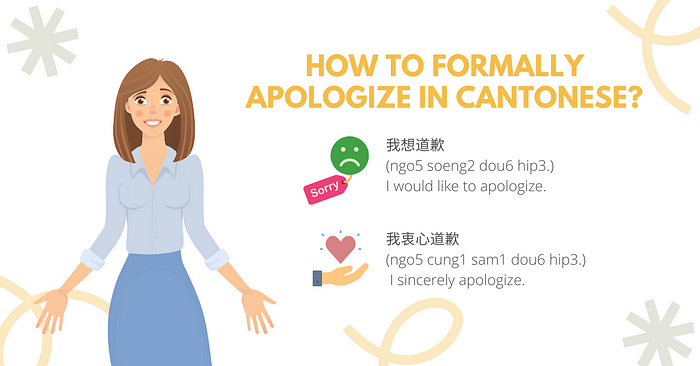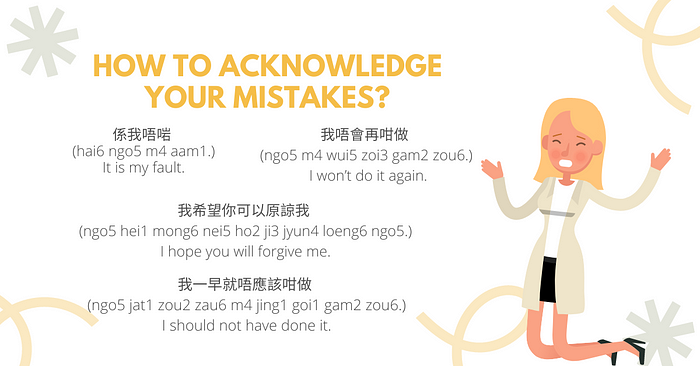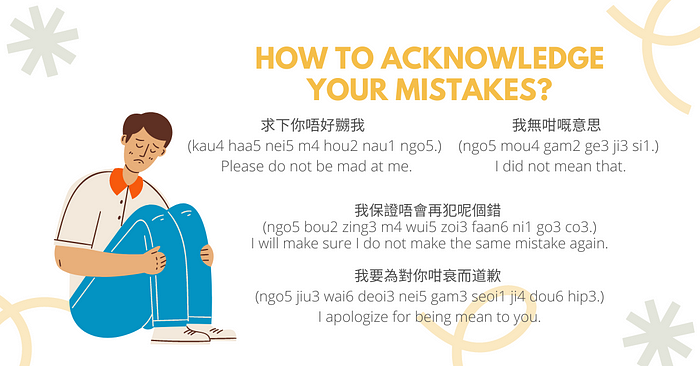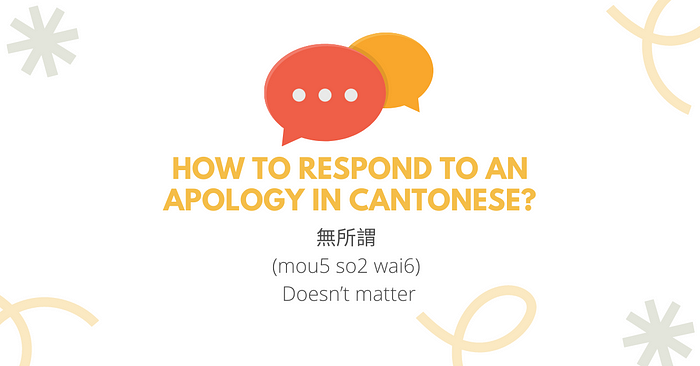Apologize In Cantonese: 12 Powerful Ways

Presuming Hong Kongers have the same behavioral customs are those in China can cause misunderstanding and will lead you to apologize in Cantonese (對唔住 / deoi3 m4 zyu6.) There is nothing wrong with an apology, but if you are new in Hong Kong, do not presume one’s opinion regarding Hong Konger-Chinese relations.
Despite the similarities between Hong Kongers and Chinese, they still differ in culture, traditions, and practices. In fact, this is one reason we are not talking about the Chinese language Mandarin but Cantonese. This is one of the most common reasons why foreigners engage in misunderstandings among locals. It is understandable, and you can simply apologize or say sorry but, it can be avoidable.
Not everyone has the courage to apologize. It can be easily felt if your apology is not sincere. This can worsen the case, and it might bring a wrong impression to the other person. So, how should we apologize? Here are some tips for you.
- Know when to apologize.
- Acknowledge that you are wrong.
- Explanation.
- Express your regret and remorse.
- Apologize for the right reasons.
- Re-establish boundaries.
- Promise for non-recurrence
- Change.
- Let go of the results.
How To Apologize In Cantonese?

Apologies symbolize respect. These are regretful acknowledgments of offense or failure. When you go to Hong Kong, there are lots of situations that you might have to say sorry and apologize to someone. So, you should learn the primary way how to say sorry and apologize in Cantonese.
1. 對唔住 (deoi3 m4 zyu6)
English Translation- Sorry
It is customary to say sorry when you have done something terrible or offend someone, even through small things. Do not underestimate misunderstandings and mistakes because you don’t know the gravity of that to the other person. The basic way to say sorry and apologize in Cantonese is 對唔住 (deoi3 m4 zyu6). This can be used on most occasions, both formal and informal. If you want to apologize in Cantonese in written form, use 對不起。deoi3 bat1 hei2.
Example:
Cantonese- 對唔住,我到時唔喺度。(deoi3 m4 zyu6, ngo5 dou3 si4 m4 hai2 dou6.)
Meaning- Sorry, I will be out of town at that time.
對唔住 (deoi3 m4 zyu6) VS 对不起 (dui bu qǐ)
When you want to learn how to say Sorry in Cantonese and search it online, the internet might give you different results. If you come across 对不起 (dui bu qǐ), you should know that it is the Mandarin term for sorry. Remember, Mandarin and Cantonese are different. If you want to know more about the difference between Mandarin and Cantonese, there’s a separate blog for you.
2. 唔好意思 (m4 ho2 ji3 si3)
English Translation- Excuse me / Sorry
Another way to apologize in Cantonese is 唔好意思 (m4 ho2 ji3 si3). Compared to the first one, this can be used in a wider range of contexts. This is a must-learn word for foreigners because you will surely need this in a variety of situations. These are the most common situations where you can use this phrase:
To grab someone’s attention.
Cantonese — 唔好意思,閘口喺邊?(m4 ho2 ji3 si3, zaap6 hau2 hai2 bin1?)
English Translation — Excuse me, where is the entrance?
To apologize for a minor incident.
Cantonese — 唔好意思,唔小心踩到你。( m4 ho2 ji3 si3, m4 siu2 sam1 caai2 dou2 nei5.)
English Translation– I’m sorry for stepping on your shoes accidentally.
To express your regret over bad news.
Cantonese — 唔好意思,無貨喇。(m4 ho2 ji3 si3, mou5 fo3 laa3.)
English Translation — I’m sorry, it is out of stock.
How To Formally Apologize In Cantonese?

Sometimes, being unaware of certain practices and customs of culture can cause misunderstandings. It is understandable since you are not from their country. To avoid such misunderstanding, use formal words, especially to strangers.
In the context of being a professional, this is also important. It is a sign of respect and politeness towards your colleagues when you use formal words. This will develop a sense of professionalism among each other which is essential in the workplace.
Try learning these two phrases how to apologize in Cantonese formally:
1. 我想道歉 (ngo5 soeng2 dou6 hip3.)
English Translation / Meaning — I would like to apologize.
This is the most common formal way of apologizing formally. If you have made a mistake for someone, whether big or small, do not hesitate to admit and say sorry right away. This phrase is usually reserved in business settings and formal situations. Remember, maintaining a good reputation and integrity is really important for Hong Kongers. For them, it is essential in the business and workplace.
Example:
我匯報得唔好,我想道歉。(ngo5 wui6 bou3 dak1 m4 hou2, ngo5 soeng2 dou6 hip3.) — I would like to apologize for my poor presentation.
2. 我衷心道歉 (ngo5 cung1 sam1 dou6 hip3.)
English Translation / Meaning — I sincerely apologize.
Have you tried saying sorry in a written form? You have probably used this word. But, this is not only meant for written apologies. This is also used to express your sincere apology to someone. Remember, apologizing without sincerity are just empty words.
Example:
Cantonese- 對於今日發生嘅事故,我衷心道歉。(deoi3 jyu1 gam1 jat6 faat3 sang1 ge3 si6 gu3, ngo5 cung1 sam1 dou6 hip3.)
Meaning- I sincerely apologize for the incident that happened today.
How To Acknowledge Your Mistake?
When is the last time you admitted that you are wrong? Was it easy for you? How did it benefit you? The first step you need to do when apologizing is to admit that you are wrong. It might be one of the hardest things to do for some but, it shows humility and understanding. You need to understand what had been wrong on your part because knowing this will lead you to open opportunities in fixing the problem.
Here are some words and phrases that you can add to your vocabulary

1. 係我唔啱 (hai6 ngo5 m4 aam1.)
English Translation / Meaning — It is my fault.
It is important to acknowledge your mistake by simply saying 係我唔啱 (hai6 ngo5 m4 aam1.). Taking responsibility means that you acknowledge that you have hurt the other person. To admit that it is your fault is something that can be admirable. There is nothing wrong with admitting your mistake. What’s wrong is being blinded by your anger and pride.
Example:
Cantonese- 我唔應該對你發火,係我唔啱。( ngo5 m4 jing1 goi1 deoi3 nei5 faat3 fo2, hai6 ngo5 m4 aam1.)
Meaning- I should not be mad at you. It is my fault.
2. 我唔會再咁做 (ngo5 m4 wui5 zoi3 gam2 zou6.)
English Translation / Meaning — I won’t do it again.
Misunderstandings are caused by differences in perspectives, beliefs, and practices. It is natural for people to have these differences but, this can also lead to misunderstandings due to a lack of awareness and sensitivity. Saying, “I won’t do it again.” (我唔會再咁做 / ngo5 m4 wui5 zoi3 gam2 zou6.) indicates that you have learned from the past situation which caused the misunderstanding. This will make you sensitive and aware of your actions.
Example:
Cantonese- 如果你唔鍾意嘅話,我唔會再咁做。 (jyu4 gwo2 nei5 m4 zung1 ji3 ge3 waa2, ngo5 m4 wui2 zoi3 gam2 zou6.)
Meaning- If you don’t like this, I won’t do it again.
3. 我希望你可以原諒我 (ngo5 hei1 mong6 nei5 ho2 ji3 jyun4 loeng6 ngo5.)
English Translation / Meaning — I hope you will forgive me.
Asking for forgiveness takes time. Like what they say, “Time heals.” It would be best to understand that you couldn’t force the other person to forgive you right away. Forgiveness is a decision followed by emotion. It is not the other way around. But, it is still important to ask for forgiveness by saying “我希望你可以原諒我” (ngo5 hei1 mong6 nei5 ho2 ji3 jyun4 loeng6 ngo5.)
Example:
Cantonese- 係我唔啱,我希望你可以原諒我。(hai6 ngo5 m4 aam1, ngo5 hei1 mong6 nei5 ho2 ji3 jyun4 loeng6 ngo5.)
Meaning- It is my fault, and I hope you will forgive me.
4. 我一早就唔應該咁做 (ngo5 jat1 zou2 zau6 m4 jing1 goi1 gam2 zou6.)
English Translation / Meaning — I should not have done it.
Regrets are always in the end. There are times when you just want to go back to the past and wish you shouldn’t have done an action that leads you to your current situation. You can say “我一早就唔應該咁做” (ngo5 jat1 zou2 zau6 m4 jing1 goi1 gam2 zou6.) to express your feelings.
Example:
Cantonese- 我知道你覺得難受,我一早就唔應該咁做。(ngo5 zi1 dou3 nei5 gok3 dak1 naan4 sau6, ngo5 jat1 zou2 zau6 m4 jing3 goi1 gam2 zou6.)
Meaning- I know it hurts you badly. I should not have done it.

5. 我保證唔會再犯呢個錯 (ngo5 bou2 zing3 m4 wui5 zoi3 faan6 ni1 go3 co3.)
English Translation / Meaning — I will make sure I do not make the same mistake again.
It is one of the best feelings in the world when the other person recognizes your apology and decided to continue what you have. But, it would be best if you established your boundaries again to make sure that it will never happen again. You can use 我保證唔會再犯呢個錯 — (ngo5 bou2 zing3 m4 wui5 zoi3 faan6 ni1 go3 co3.) in expressing this emotion and to show that you are serious about re-establishing your relationship.
Example:
Cantonese- 我唔應該咁做,我保證唔會再犯呢個錯。 ngo5 m4 jing3 goi1 gam2 zou6, ngo5 bou2 zing3 m4 wui5 zoi3 faan6 ni1 go3 co3.
Meaning- I should not have done this, and I promise I will not make the same mistake again.
6. 我要為對你咁衰而道歉 (ngo5 jiu3 wai6 deoi3 nei5 gam3 seoi1 ji4 dou6 hip3.)
English Translation / Meaning — I apologize for being mean to you.
When someone is unhappy or frustrated with a certain situation, they may react and do things that will release tension. If you are in this situation, it is hard to see this because you are too caught with your emotions. Later, when you can cool down and think, you will realize what you did wrong. There is no excuse for being mean to someone so, if you have ever been mean to someone, you can say 我要為對你咁衰而道歉 — (ngo5 jiu3 wai6 deoi3 nei5 gam3 seoi1 ji4 dou6 hip3.)
Example:
Cantonese- 我唔應該笑你,我要為對你咁衰而道歉。 (ngo5 m4 jing1 goi1 siu3 nei5, ngo5 jiu3 wai6 deoi3 nei5 gam3 seoi1 ji4 dou6 hip3.)
Meaning- I should not have laughed at you. I apologize for being mean to you.
7. 求下你唔好嬲我 — (kau4 haa5 nei5 m4 hou2 nau1 ngo5.)
English Translation / Meaning — Please do not be mad at me.
This phrase is not a request. Saying 求下你唔好嬲我 (kau4 haa5 nei5 m4 hou2 nau1 ngo5.) means that you are admitting that you have done something bad because of certain reasons. No matter how good your intention is, sometimes, it can still hurt other people. Again, you can’t control how other people feel. You just really hope that they will forgive you despite your wrongdoings.
Example:
Cantonese- 我唔會再咁做,求下你唔好嬲我。 (ngo5 m4 wui5 zoi3 gam2 zou6, kau4 haa5 nei5 m4 hou2 nau1 ngo5.)
Meaning- I won’t do it again. Please don’t be mad at me.
8. 我無咁嘅意思 (ngo5 mou4 gam2 ge3 ji3 si1.)
English Translation / Meaning — I did not mean that.
Saying 我無咁嘅意思 (ngo5 mou4 gam2 ge3 ji3 si1.) is part of an apology. Most of the time, misunderstandings are caused by words and actions that we don’t mean. That is why it is important not to say things out of anger. Speaking with such anger and a grudge can cause too much pain to the person you are talking to.
Example:
Cantonese- 可能中間有啲誤會,我無咁嘅意思。 (ho2 nang4 zung1 gaan1 jau5 di1 ng6 wui6, ngo5 mou4 gam2 ge3 ji3 si1.)
Meaning- I did not mean that. I guess there could be some misunderstanding.
After learning all of these ways to apologize in Cantonese, the most important thing you should remember is to be polite and sincere. Remember also to watch your tone and keep it flat. A sincere apology in Hong Kong does not require any gesture and posture. A simple bow and a sincere look in the eyes are enough.
How To Respond To An Apology In Cantonese?

Acceptance is part of the healing process. It’s a different thing when someone says sorry to you. If someone admits that they are wrong, do not belittle them. It is something that takes courage. It is also a sign of being humble. But, the gracefulness of the person accepting the apology will determine what will be the next step of the relationship. So, if you are in that position, take note of the following tips that you should learn remember:
- Decide if you really accept their apology.
- Give yourself time.
- Understand your own vulnerability.
Now that you have learned some tips about accepting an apology try learning these words and phrases and add them to your vocabulary. This is how you respond to an apology in Cantonese.
- 無所謂 (mou5 so2 wai6) — Doesn’t matter
- 無問題 (mou5 man6 tai4) — No problem
- 唔緊要 (m4 gan2 jiu3) — No worries / Nevermind
According to Suzane Somers, “Forgiveness is a gift you gave to yourself.” Forgiveness doesn’t mean forgetting. Apologies do not change the past, but it surely enlarges the future. If you say sorry over and over again but keep doing the same thing, your words are meaningless. Forgive but do not forget the lesson it taught you.
Fix relationships and say sorry before everything is too late. Yes, not everyone will stay as part of your life but, one of the saddest things in life is when a person with whom you shared some great memories becomes a memory.
Other Cantonese Phrases For Apology
Here are some additional Cantonese phrases and expressions that you can use to say an apology.

Feeling Sorry Not Knowing How To Speak Cantonese? Worry No More!
If you like learning Cantonese through this blog post, you will surely love what we have for you in Ling App. This will provide you lessons for language learning designed to monitor your progress and master your skills. Through Ling App, you will learn, starting from the basics down to the more complex lessons. You will be able to understand what each word means and how to use it in a sentence. You can also read blog posts related to languages and language learning like this. Language learning will surely be exciting and engaging!

If you plan to go to Hong Kong and don’t know any Cantonese word or phrase, you better be thinking twice. You should learn Cantonese because Cantonese is a beautiful language to learn. It is more than just words and phrases about apologies and saying sorry. It is a language that connects Hong Kongers in one. It is a language that is open for foreigners to learn and discover. So, what are you waiting for? Learn Cantonese now!
Original blog post: https://ling-app.com/zhe/apologize-in-cantonese/
